Mostly Labor Day Monday Reads
Posted: September 1, 2025 Filed under: "presidential immunity", #FARTUS, #MAGAnomics, #We are so Fucked, 2025 What Fresh Hell? | Tags: Attacks on Labor and Unions by the Trump Regime, FARTUS, SCOTUS enabling a despot, Violent Crime is High in Red Rural America 14 Comments
“The trumps are laboring.” John Buss @repeat1968
Happy Labor Day, Sky Dancers!
Labor Day is the unofficial day that America leaves its summer to start all things Autumn. This is a particularly notable Labor Day because there are ongoing attacks on workers and unions, as well as universities and public schools that are opening up to greet a new fall term. Fall is the time for harvesting. This year’s harvest is full of the results of extremist policies and plots. It’s time to start campaign season with an eye to ridding ourselves of the sources.
I live in New Orleans, which is well known as America’s most European city, and I’m glad of that. It’s surrounded by the Deep South and many rural areas. Things are not going so well there. Resources have been pulled from many of the country’s outlands when they need them badly. I’ll start with this analysis from AXIOS. “Rural South, West states have highest violent crime rates: FBI.” Contrary to the belief of this racist regime, the nation’s outlands have the worst violent crime rates. Watching what’s become of our Nation’s Capital City sickens me. People feel invaded and demonstrate daily. Our National Guard, needed in their own states, our literally picking up garbage.
Rural states in the American South and West had some of the nation’s highest violent crime and homicide rates in 2024, driven by violence in small communities, according to an Axios analysis of FBI data.
Why it matters: A state-by-state comparison paints a complex picture of U.S. crime trends as President Trump threatens to send the National Guard to Democrat-controlled cities in blue states over concerns about violent crime.
The big picture: The president has already dispatched the National Guard to Washington, D.C., and is threatening to send troops to Chicago, Oakland, Calif., and Baltimore.
- Now Trump is facing questions about whether he’ll send troops to communities in red states — many of them largely rural — where crime rates are actually higher than the areas he’s targeted.
- “Sure, but there aren’t that many of them,” Trump said last week.
By the numbers: The southern states of Louisiana, Tennessee, Alabama, Arkansas and South Carolina were among the national leaders in both violent crime and homicide rates last year, an Axios review of FBI data found.
- All had violent crime and homicide rates well above the national average.
- Alaska, the country’s most rural state, led the nation with the highest violent crime rate of 1,194.3 per 100,000 residents. That’s more than three times the national average of 359.1.
- New Mexico, another rural state, was second with a violent crime rate of 757.7 per 100,000 residents, more than two times the national average.
Big states such as California and New York, both targets of Trump, ranked high in total violent crime numbers because of their large populations, but their per-capita rates were similar to those of Arkansas and Tennessee, the Axios review found.
Zoom out: Alaska and New Mexico also led the nation in homicide rates with 11.3 homicides per 100,000 residents each, more than twice the nation’s homicide rate of 5 per 100,000 residents.
- Pennsylvania was third nationally with a homicide rate of 10.1, followed by Louisiana, Alabama, and Tennessee.
- Illinois, home to Chicago, which Trump has called a “killing field,” had a homicide rate of 6 per 100,000 residents, ranked 20th in the nation.
Zoom in: Big-city crime often receives the most attention in political discourse, but an Axios analysis of rural states found that violence in small towns is driving some of the nation’s highest crime rates.
- For example, Fairbanks, Alaska, population roughly 32,000, had a violent crime rate of nearly 700 per 100,000 residents, about twice the national average.
- McKeesport, Pa., a city of 18,000 outside Pittsburgh, had a violent crime rate of 1,693.7 and a homicide rate of a whopping 32.5 per 100,000 people. It consistently ranks among the most dangerous cities in the country, a situation officials have largely attributed to a long-term decline in its industrial economy.
- Dyersburg, Tenn., a community of 16,000, has a violent crime rate of 1,256.5 and a homicide rate of 18.8.
What they’re saying: “If Washington, D.C., (were) a state, it would have the highest homicide rate of any state in the nation,” the White House said in a statement on Aug. 11 before dispatching the National Guard.
- D.C.’s homicide rate was 25.9 per 100,000 residents in 2024.
Yes, but: D.C. isn’t a state, it’s a city. Among the cities with the highest homicide rates in the U.S., Washington is ranked 11th, according to an Axios review of cities with 100,000 people or more with high homicide rates.
- Jackson, Miss., population about 141,500, had the nation’s highest homicide rate last year — nearly 78 per 100,000 residents. That’s more than 15 times the national average. There has been no national discussion about sending troops there to combat crime.
Between the lines: Rural crime often gets overlooked because most media outlets are centered in urban areas and focus just on crime there, Ralph Weisheit, a criminal justice professor at Illinois State University, tells Axios.
- The reasons for crime in rural areas vary, but Weisheit said in many cases, communities have been ravaged by drug addiction.
 Mike Johnson really needs to pay more attention to his constituents than he does #FARTUS. The consensus among many analysts is that Trump is militarizing large democratically run cities to terrorize their citizens into not voting. It’s also why he’s so interested in stopping early and mail-in voting.
Mike Johnson really needs to pay more attention to his constituents than he does #FARTUS. The consensus among many analysts is that Trump is militarizing large democratically run cities to terrorize their citizens into not voting. It’s also why he’s so interested in stopping early and mail-in voting.
This is from The Brennan Center for Justice. “Crime as a Cover. The claim that troops are needed to fight local crime is nothing but a pretext.” The analysis is reported by Michael Waldman. Trump is doing everything he can to become a despot.
President Trump has threatened to send troops to Chicago to “straighten that one out.” New York City, he says, might be next.
Already, armed National Guard regiments are patrolling the streets of Washington, DC. All this on top of the deployment of troops to Los Angeles earlier in the summer.
The deployment of out-of-state troops to occupy cities cannot plausibly promote public order. It’s blunt force, a brutal power grab. It runs afoul of the Constitution and the proper role for states.
I write history books and consider myself an expert on the presidency. I can think of few analogies — not in this country, anyway — for such a move by a chief executive.
Why is this particular turn so alarming? After all, public safety is important, and fighting crime is a worthy goal. My colleague Liza Goitein explains the legal and constitutional issues:
Trump is on even thinner legal ice with this plan than he is in Los Angeles and DC. Unlike in the capital, the president doesn’t command the Illinois National Guard unless he calls them into federal service (i.e., “federalizes” them). There are various laws that authorize him to federalize the Guard, but none of them would apply here.
In Los Angeles, Trump is relying on a law (Section 12406 of Title 10 of the U.S. Code) that authorizes federalization when “the President is unable with the regular forces to execute the laws of the United States,” meaning federal law. Immigration law is federal law. Trump claimed that the protests rendered him “unable . . . to execute” ICE raids. Although dozens of raids happened during the protests and the administration did not cite a single raid that was thwarted, the Ninth Circuit Court of Appeals deferred to Trump’s assessment.
But that law simply wouldn’t apply to the type of crime Trump has cited in Chicago — essentially, violent street crime. The laws that are implicated are largely those of Illinois and Chicago, not the “laws of the United States.”
Even under the Insurrection Act — which is the main exception to the law barring deployment of the military for domestic law enforcement — the president may deploy troops to execute the law only in situations involving either federal laws or those state laws designed to protect the constitutional rights of classes of people (basically, civil rights laws).
Nor can Trump ask other states’ governors to send their Guard forces into Chicago, as he did in DC under a law known as Section 502(f), which authorizes governors to voluntarily use their Guard forces for missions requested by the president or secretary of defense. Under this law, presidents have asked governors to deploy Guard forces within their own states, in other states that consent, or (as only Trump has done) in DC without local consent. No governor has sent Guard troops into another state that did not consent, as would be the case here. That’s because Guard forces deployed under this law remain state officers as a legal matter. And under the Constitution, states are sovereign entities vis-à-vis one another. That means one state cannot invade another, even at the president’s request.
If the president wants to send one state’s National Guard forces into an unwilling state, he must federalize them first. But to federalize them, he needs statutory authority. And there is no statutory authority to federalize the Guard to police local crime.
The Pentagon reportedly sees its planned military deployment in Chicago as a model for other cities. And of course, the other cities Trump has name-checked in this context are governed by Democrats: Baltimore, Los Angeles, New York, and Oakland.
Flooding “blue” cities with soldiers on the pretext of fighting crime would be an unprecedented abuse of power that would violate states’ rights and threaten our most fundamental liberties. The plan is profoundly un-American. And it is illegal.
Public safety matters greatly. But facts belie the (ever shifting) rationale. New York, for example, remains one of the nation’s safest large cities. As Police Commissioner Jessica Tisch told Attorney General Pam Bondi yesterday, crime has dropped dramatically, even this year. Fighting crime is not a rationale — it’s a pretext.
The cities targeted so far have two things in common: a Black mayor and a fusillade of presidential rhetoric denouncing them as “hellholes.”
Bill Kristol, founder of The Bulwark and a longtime prominent Republican, surveyed the past week and put it this way: “What we are seeing is not merely a ‘slide toward authoritarianism.’ It’s a march toward despotism. And it’s a march whose pace is accelerating.”
What can be done to push back? Illinois Gov. JB Pritzker warned federal forces, “Do not come to Chicago. You are neither wanted here nor needed here.” Trump, in turn, mused, “They say . . . ‘He’s a dictator. He’s a dictator.’ A lot of people are saying, ‘Maybe we’d like a dictator.’” He added, “I don’t like a dictator. I’m not a dictator.” (As presidential quotations go, it’s about as reassuring as Richard Nixon’s “I am not a crook.”)
Pritzker and New York Gov. Kathy Hochul can play pivotal roles. States and cities can go to court — an epic legal battle. They can rally the public in their states and around the country. They can monitor and document the conduct of deployed forces.
We must all speak out when our Constitution is under threat.
Get some rest this Labor Day. It’s going to be a busy fall.
 I still see most of these actions as enablements of the Supreme Court. I’m not the only one. This is from Justin Jouvenal writing for The Washington Post. “The Supreme Court has expanded Trump’s power. He’s seeking much more. The president’s firing of Federal Reserve governor Lisa Cook and other cases could serve as major tests of how far the high court is willing to go.” Removing the independence of the FED is another way of turning us into a Banana Republic.
I still see most of these actions as enablements of the Supreme Court. I’m not the only one. This is from Justin Jouvenal writing for The Washington Post. “The Supreme Court has expanded Trump’s power. He’s seeking much more. The president’s firing of Federal Reserve governor Lisa Cook and other cases could serve as major tests of how far the high court is willing to go.” Removing the independence of the FED is another way of turning us into a Banana Republic.
The Supreme Court has already expanded President Donald Trump’s authority in a string of emergency rulings, but he’s signaling in his firing of Federal Reserve governor Lisa Cook and other issues likely headed to the court that he continues to seek broader powers for the executive branch.
The cases could serve as major tests of how much further the nation’s high court is willing to go to bless the president’s assertion of executive authority. They differ from previous showdowns because of the sheer magnitude of the authority Trump is seeking to wield and because he wants greater control over powers the Constitution ascribes to another branch of government.
In addition to Cook’s lawsuit, which could make its way to the high court after she sued last week, a blockbuster case over Trump’s tariffs is expected to arrive at the high court soon after an appeals court struck them down. The Trump administration’s pushto withhold tens of billions of dollars in foreign aid appropriated by Congress could also end up in the court.
Peter Shane, a law professor at New York University, called Trump’s assertions “breathtaking.”
“Other presidents have tried to use their authority aggressively, but usually it’s been done through aggressive interpretations of statutory law and in a pretty targeted way,” Shane said.
Each of the presidential powers being contested by Trump, he said, “is a challenge to what I think heretofore would have been regarded as a core power of Congress.”
The high court has already signaled openness to broad presidential authority to replace some heads of independent agencies.
The justices handed Trump a major victory in May when they allowed him to remove the leaders of the National Labor Relations Board and the Merit Systems Protection Board while legal challenges play out over their firings. Trump gave no reasons for the dismissals.
The court’sconservative majority ruled the Constitution vests all executive power in the president, so Trump could fire the agency heads “without cause” even though Congress set up the agencies to be insulated from political interference.
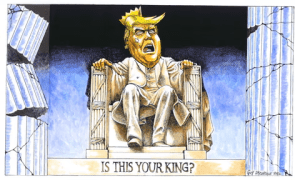 There it is. The direct attacks on labor. This is a guest Op-Ed in the New York Times (gift article) by labor historian Erik Loomis.”Trump Is Wiping Out Unions. Why Are They So Quiet?”
There it is. The direct attacks on labor. This is a guest Op-Ed in the New York Times (gift article) by labor historian Erik Loomis.”Trump Is Wiping Out Unions. Why Are They So Quiet?”
This is a most unfortunate Labor Day for labor. The labor movement has taken it on the chin repeatedly in the last several decades, but President Trump is the most ruthlessly anti-labor president since before the Great Depression.
If the labor movement does not fight harder than it has since Mr. Trump regained the presidency, its future will be dire.
Mr. Trump and his administration have unilaterally stripped collective bargaining rights from hundreds of thousands of federal workers. At the Department of Veterans Affairs alone, 400,000 workers, or 2.8 percent of America’s unionized workers, have lost their collective bargaining rights because of an executive order that will eventually affect more than one million federal workers. Mr. Trump ushered in Labor Day weekend on Thursday by continuing his assault of federal unions, adding the Patent Office, NASA and the National Weather Service to his list of targeted agencies.
Despite this assault on their very existence, we have barely heard a peep from unions. Where is organized labor in the public fight to maintain union jobs, stop the stripping of the safety net and lead the fight for democracy? Other than some statements and angry speeches, the movement has been muted.
If the labor movement wants to fight for its survival, it must return to mass mobilization tactics, reminding Americans that their rights come through working together — not through supporting a president who talks about helping American workers while slashing worker safety regulations, supporting tariffs that raise the cost of consumer goods and stripping workers of their legal rights to contracts.
All this is happening at a time when Americans’ approval of unions is the highest it has been since the mid-1960s.
One cannot overstate the significance of Mr. Trump’s attacks on government workers. Public sector work has become organized labor’s power base, allowing the total workforce’s union membership rate to remain at around 10 percent, despite less than 6 percent of private sector workers having unions.
Based on actions Mr. Trump has taken this year — and without any notable public pushback from supposedly pro-labor Republicans like Josh Hawley and Marco Rubio — it is unlikely that there will be any unionized federal workers outside of policing agencies by the end of his term in 2029.
Mr. Trump has attacked workers in other ways. He has gutted the Department of Labor through cuts by the Department of Government Efficiency. He is also rolling back Labor Department rules from the Obama and Biden administrations that allowed home care workers to earn overtime and farmworkers to campaign for better working conditions. And he has severely undermined the National Labor Relations Board, which handles thousands of union matters every year by firing its head and nominating corporate-friendly figures to steer its operations away from supporting workers.

“Hurry Sundown.” John Buss, @repeat1968
Read more about the reasons at the link. Russia is getting more brazen, given that Putin has reason to believe the United States will enable his attacks on democracy. This is from CNN. “Plane carrying EU’s top leader targeted by alleged Russian GPS jamming.” This is reported by Ivana Kottasová.
A plane carrying the European Commission President Ursula von der Leyen was targeted by GPS navigation jamming while trying to land in Bulgaria on Sunday, a spokesperson for the commission told CNN.
The commission received “information from Bulgarian authorities that they suspect this blatant interference was carried out by Russia,” said European Commission Deputy Chief Spokesperson Arianna Podestà.
The plane landed safely, the spokesperson said. A source familiar with the situation told CNN the pilots landed the plane using paper maps.
Von der Leyen and the commission have been staunch supporters of Ukraine as Kyiv tries to defend itself against Russia’s unprovoked aggression. She was one of the European leaders who attended US President Donald Trump’s summit on Ukraine last week and has consistently urged EU member states to allocate more resources to helping Ukraine.
The incident occurred as the president was about to land at the Plovdiv International Airport in the south of Bulgaria, part of her tour around member states in the eastern part of the bloc to rally support for Ukraine.
“This incident underlines the urgency of the President’s current trip to frontline Member States, where she has seen first hand the every day threats from Russia and its proxies,” Podestà told CNN.
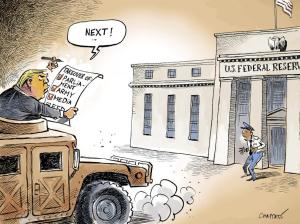 Not only are Russia and China getting brave, but India’s Modi has been driven straight into their arms by Trump. This is an alarming headline from Christian Shepherd writing for The Washington Post. “China tries to use Trump turmoil to unite leaders against U.S.-led order. Twenty leaders — including from Russia, Iran and India — are in China for a summit designed to promote Beijing as a reliable counterweight to the U.S.” This is happening as Trump cuts more foreign aid and Kari Lake disables the Voice of America. I thought Yam Tits considered them his buddies?
Not only are Russia and China getting brave, but India’s Modi has been driven straight into their arms by Trump. This is an alarming headline from Christian Shepherd writing for The Washington Post. “China tries to use Trump turmoil to unite leaders against U.S.-led order. Twenty leaders — including from Russia, Iran and India — are in China for a summit designed to promote Beijing as a reliable counterweight to the U.S.” This is happening as Trump cuts more foreign aid and Kari Lake disables the Voice of America. I thought Yam Tits considered them his buddies?
Chinese leader Xi Jinping on Monday called on the leaders of countries including Russia, Iran and India to integrate their economies and build an “orderly multipolar world,” as he tried to unite them in their shared grievances with the U.S.-led global order and the policies of President Donald Trump.
Xi used the platform of the Shanghai Cooperation Organization summit here, 90 miles southeast of Beijing, to implicitly criticize Trump’s policies — without naming him or mentioning the United States.
He urged the 20 foreign leaders in attendance to “seek integration, not decoupling” and “unequivocally oppose power politics.”
Member countries should “serve as a cornerstone for the promotion of a multipolar world” and join a China-led “global governance initiative,” he said in closing remarksafter a day in which leaders put on shows of chumminess and met for private talks on the sidelines of the mostly scripted event.
The Chinese leader’s new initiative will help provide stability at a time of rising turbulence and end “the monopoly of global governance by some countries,” Foreign Minister Wang Yi said in a news briefing Monday night after Xi’s remarks.
Xi held a bilateral meeting with India’s Narendra Modi Sunday and will hold a one-on-one with Vladimir Putin of Russia on Tuesday.The three were filmed holding hands and smiling as they chatted on Monday.
Xi also proposed deepening economic ties to take advantage of the group’s “mega-sized market,” including by establishing a SCO development bank. China has already invested $84 billion in member countries and would provide another $1.4 billion in loans over the next three years, he said.
The forum is a key part of China’s campaign to be seen as a reliable partner and a counterweight to U.S. unpredictability in an increasingly multipolar world. Modi’s attendance in particular — his first visit to the country in seven years — is a milestone in Beijing’s attempt to mend ties with an influential U.S. partner that has been alienated by Trump’s tariffs.
 California’s Governor Newsom is still trolling Trump. It may not be classy, but it sure is funny! “Gavin Newsom continues to troll Trump by blasting ‘I’m a Survivor’ in post about president’s health. Donald Trump’s bruised hands mocked by California governor in Instagram video bringing together some of the president’s most embarrassing moments.” This is from The Independent and reported by Joe Summerlad.
California’s Governor Newsom is still trolling Trump. It may not be classy, but it sure is funny! “Gavin Newsom continues to troll Trump by blasting ‘I’m a Survivor’ in post about president’s health. Donald Trump’s bruised hands mocked by California governor in Instagram video bringing together some of the president’s most embarrassing moments.” This is from The Independent and reported by Joe Summerlad.
California Democratic Gov. Gavin Newsom has continued his trolling campaign against Donald Trump, this time posting a video on Instagram making light of the president’s health complaints.
The montage, set to the 2001 song “I’m a Survivor” by country music star Reba McEntire, pulls together some of Trump’s most embarrassing gaffes in the public eye, from tripping on the steps to Air Force One to recoiling in horror from a squawking eagle and being bumped in the chin by a rogue reporter’s microphone.
“He’s trying,” the post is captioned.
Drawing an ironic contrast between the president’s opulent lifestyle and the song’s lyrics about a “single mom who works two jobs,” the clip also pays particular attention to the bruises spotted on Trump’s hands in recent months.
The commander-in-chief was recently diagnosed with chronic venous insufficiency but speculation about his wellbeing raged well before that and has not abated since the condition was revealed.
JJ has informed me that you must turn off your location before going to Instagram, as they are posting it on MAPS.
I hope you got some rest and relaxation this weekend. I’ve been hanging in the house trying to avoid reality.
What’s on your reading and blogging list today?
Finally Friday Reads: Escaping Today and 20 years Ago
Posted: August 29, 2025 Filed under: "presidential immunity", #FARTUS, #We are so Fucked, 2025 What Fresh Hell?, American Fascists, Civil Liberties, Civil Rights, Constitutional Crises, kakistocracy | Tags: #FARTUS Mafia State, 20th Anniversary of Hurricane Katrina, CDC massive firings, Occuping US Cities, Orange Caligula, Pocket Recission, RFK Jr Weirdo, Unconstitutional Trump Moves, Yam Tits 8 Comments
“How dare they!” John Buss, @repeat1968
Good Day, Sky Dancers!
I’m moving quite slowly today. I thought I had mentally prepared myself for the 20th Katrinaversary. Emotions have check-mated all that. I’m glad for the 4-day weekend because I need more solitude than usual. I evacuated with Miles, my cat, and my labs, Honey and Karma, to join the Grad students who were staying in a Lake Charles Motel. I had told them to evacuate even though my original plan was to stay. I grabbed the craziest things before heading out in the mighty mustang. The last thing I did was try to cover my grandmother’s Steinway parlor grand with an orange tarp. It took me all day, in mostly stopped traffic, to get to Lake Charles. I slept on a futon on the floor with two grad students. I drove to Dallas, where they could catch a plane and a bus to safety. I headed to Omaha, where my oldest daughter had just started Med School, and my youngest was finishing up high school. I really wanted to avoid talking about it today. But it is what it is.
My late friend Jane took me in, and I spent a lot of time glued to CNN reports. All I heard was the devastation in the Ninth Ward. They did not figure out that there were upper and lower 9. I finally saw my house on Google’s satellite. It was there, roof and all. When I got home and realized that buying a house on the “sliver by the river” was the best decision I ever made. I had minor wind damage and some damage caused by the neighbor’s roof hitting my house. When I was finally able to see the real damage up close, I developed survivor’s guilt as well as PTSD. I relive that annually. I’ve made my short trips to the Gulf Coast since then. Every time I drove to the lower 9 to show friends and family the devastation up and beyond Thanksgiving, they were still pulling bodies from buildings. Never forget the incompetence that let this happen and killed so many.
 I never thought I’d see an administration as incompetent as Dubya Bush. But here we are. Let’s review today’s disaster. I planned to start with RFK Jr., but then Yam Tits did something astoundingly awful today. This is from Politico. “White House declares $4.9B in foreign aid unilaterally canceled in end-run around Congress’ funding power. The administration is setting up clash with Capitol Hill over its use of the “pocket rescission.”
I never thought I’d see an administration as incompetent as Dubya Bush. But here we are. Let’s review today’s disaster. I planned to start with RFK Jr., but then Yam Tits did something astoundingly awful today. This is from Politico. “White House declares $4.9B in foreign aid unilaterally canceled in end-run around Congress’ funding power. The administration is setting up clash with Capitol Hill over its use of the “pocket rescission.”
President Donald Trump threw a grenade Friday into September government funding negotiations on Capitol Hill, declaring the unilateral power to cancel billions of dollars in foreign aid by using a so-called pocket rescission.
Escalating the administration’s assault on Congress’ funding prerogatives, the White House budget office announced Friday morning that Trump has canceled $4.9 billion through the gambit that Congress’ top watchdog and many lawmakers argue is an illegal end-run around their “power of the purse.”
The move to unilaterally nix money previously approved by Congress raises tensions on Capitol Hill as lawmakers face an Oct. 1 deadline to avoid a government shutdown, pitting Republicans at the White House against GOP lawmakers and increasing pressure on Democrats to force a funding lapse unless Trump stands down.
Democrats and Republicans alike have warned that a pocket rescissions request would hamper cross-party talks to avert a shutdown at the end of September, while fulfilling White House budget director Russ Vought’s wish that the process of funding the government be “less bipartisan” to accommodate a raft of conservative priorities.
Senate Minority Leader Chuck Schumer hinted Friday that Democrats could refuse to offer the votes to get a government funding bill through the chamber before funding lapses late next month if congressional Republicans don’t push back against Trump’s latest funding move.
“Republicans don’t have to be a rubber stamp for this carnage,” Schumer said, adding that “if Republicans are insistent on going it alone, Democrats won’t be party to their destruction.”
Yet three congressional Republicans, granted anonymity to speak candidly, said they expect Vought to send additional requests to revoke funding between now and the end of the current fiscal year, which would only inflame tensions.
“Any effort to rescind appropriated funds without congressional approval is a clear violation of the law,” the Senate’s top Republican appropriator, Maine Sen. Susan Collins, said in a quick and clear rebuke of the Trump administration’s gambit.
But the Trump administration is embracing the strategy boldly and without apology, while also signaling it intends to stare down any legal challenges that may come its way as a result: “Congress can choose to vote to rescind or continue the funds — it doesn’t matter,” an official from the White House budget office said in a statement. “This approach is rare but not unprecedented.”
 I’m seriously waiting for the Democratic Congress Leadership to respond to this. Talking Points Memo has that angle on this story. “Democrats Predict Shutdown After Trump Tries to Snatch Congress’ Most Important Power.” We’ll see. This is reported by Kate Riga.
I’m seriously waiting for the Democratic Congress Leadership to respond to this. Talking Points Memo has that angle on this story. “Democrats Predict Shutdown After Trump Tries to Snatch Congress’ Most Important Power.” We’ll see. This is reported by Kate Riga.
Congressional Democrats point to skyrocketing odds of a government shutdown Friday after President Trump announced that he’ll unilaterally take back money Congress had already appropriated for foreign aid, according to multiple outlets.
“As the country stares down next month’s government funding deadline on September 30th, it is clear neither President Trump nor Congressional Republicans have any plan to avoid a painful and entirely unnecessary shutdown,” Senate Minority Leader Chuck Schumer (D-NY) said in a statement.
The move forces members of Congress to confront a question that has lingered over the legislative branch all year: What is the point of the two parties negotiating a federal budget if the executive branch insists it has the power to unilaterally determine what funds get spent? In this case, the administration seeks to make use of a loophole it claims it has discovered to refuse to spend funds appropriated by Congress.
The unprecedented gambit goes even further than what unfolded in July, when the White House sought to cancel money Congress had already approved. Then, at least, lawmakers voted on the rescission, which required only 50 votes and passed with only Republican support. This time, Trump isn’t bothering to get congressional Republicans’ sign-off. This new so-called pocket rescission totals $4.9 billion, according to the Office of Management and Budget.
“Any effort to rescind appropriated funds without congressional approval is a clear violation of the law,” Sen. Susan Collins (R-ME), the Senate’s head appropriator, said in a Friday statement. She pointed to the Government Accountability Office (GAO) finding that pocket rescissions are illegal under the Impoundment Control Act, as well as Congress’ power of the purse. The GAO, an independent watchdog agency within the legislative branch, has repeatedly stated that pocket rescissions are illegal.
“Republicans should not accept Russ Vought’s brazen attempt to usurp their own power. No president has a line item veto — and certainly not a retroactive line item veto,” Sen. Patty Murray (D-WA), the head Democratic appropriator, said in a statement, calling it an “absurd, illegal ploy” to “steal” lawmakers’ congressional power.
Vought, the director of the OMB, has led the charge on pocket rescissions, telegraphing for months his intention to request the rescission once the clock wound down on the fiscal year. Under the administration’s untested theory of the case, the timing loophole lets the President zero out any already allocated funds he chooses.
“I refuse to label Vought’s gambit a ‘pocket rescission’ because it gives his unlawful attempt to steal the promises Congress enacted an air of legitimacy it does not deserve,” Rep. Rosa DeLauro (D-CT), the head Democratic appropriator in the House, said in a Friday statement.
Experts are dubious that even this ultra-conservative Supreme Court will sign off on such a brazen defiance of the separation of powers, with one telling TPM he doubts the gambit will get “a single vote” from the justices.
The move also strips the minority of what little power it usually has to demand concessions in exchange for votes during the appropriations process.
 Now, we may switch to the conspiracy theorist who runs Health and Human Services, and specifically the CDC. RFK Jr. is in a race with Yam Tits to win the crown for the most insane person in this regime. This analysis is from Don Monyihan’s Substack, Can We Still Govern? “RFK Jr. is bad for your health. Public servants are trying to warn us that state capacity is being undermined. The Centers for Disease Control shitshow is a microcosm of the mismanagement of the Trump era. It also demonstrated some extraordinary courage among principled public servants, who were willing to lose their jobs to draw attention to damage being done to public health.”
Now, we may switch to the conspiracy theorist who runs Health and Human Services, and specifically the CDC. RFK Jr. is in a race with Yam Tits to win the crown for the most insane person in this regime. This analysis is from Don Monyihan’s Substack, Can We Still Govern? “RFK Jr. is bad for your health. Public servants are trying to warn us that state capacity is being undermined. The Centers for Disease Control shitshow is a microcosm of the mismanagement of the Trump era. It also demonstrated some extraordinary courage among principled public servants, who were willing to lose their jobs to draw attention to damage being done to public health.”
The Secretary of Health and Human Services, Robert F. Kennedy Jr. is an anti-vax crank. He should never have been confirmed to any sort of public health position. He lied to the Senate about how he would manage vaccines if confirmed, and most Republican Senators, including physician Dr. Bill Cassidy, chose to believe him and ignore his record.
While much of RFK Jr.’s work at HHS is meaningless photo-ops with food providers promising to remove food dyes here, or add beef tallow there, he has invested real effort in exactly the place his record suggested: targeting vaccines. He has fired all members of the CDC vaccine advisory committee, baselessly accusing them of conflicts-of-interest, and replacing them with fellow vaccine skeptics.
To be clear, this goes beyond Covid vaccines: childhood vaccines to stop the spread of preventable diseases are now in the crosshairs, even after Kennedy assured Senator Cassidy that they would not be touched. Kennedy has defunded research on mRNA vaccines, ensuring that the world will less ready for the next pandemic. He is encouraging states to weaken vaccine requirements.
On Monday, RFK Jr. told the CDC Director, Susan Monarez, in place for just over a month, to accept two conditions if she wanted to keep her job.
First, he wanted her public support for his policies to limit access to vaccines. Monarez is an infectious disease scientist who has served in government for a long time. In effect, RFK Jr. was asking that she lend her personal credibility as a scientist, and the credibility of CDC, to his anti-vax policies. She demurred, saying she needed to talk to senior staff at CDC.
Second, Kennedy ordered her to fire those staff. Since they are career civil servants, it would be illegal to fire them without cause, although this has become the norm now in the Trump administration. For example, career officials at FBI were fired for refusing to fire their fellow civil servants without cause.
Monarez refused both requests.
To be clear, RFK Jr. can implement these vaccine policies without the blessing of Monarez. What he wants is for public health officials to lie to the public. What he wants is to purge medical doctors and infectious disease researchers with decades of public health experience if they don’t go along with his woo-woo medical theories.
 Elizabeth Cooney has this analysis at STAT. “Crisis within CDC is spilling into real world, experts say. From food safety to vaccine availability, loss of trust and talent threaten health: ‘We are in much worse shape’”
Elizabeth Cooney has this analysis at STAT. “Crisis within CDC is spilling into real world, experts say. From food safety to vaccine availability, loss of trust and talent threaten health: ‘We are in much worse shape’”
The implosion of leadership at the Centers for Disease Control and Prevention threatens the agency, its mission, and the trust people place in public health, medical experts told STAT Thursday, a day after Director Susan Monarez refused to dismiss top scientists only to be ousted herself.
The crisis in the agency, which has been battered by personnel and policy changes ordered by health secretary Robert F. Kennedy Jr., is spilling into real-world harms, the experts said. They are seeing uncertainty from the public about vaccine recommendations and availability, in light of new Covid-19 vaccine policies announced by Kennedy, as well as deeper concerns about emergency preparedness for the inevitable next challenge to the nation’s health.
“I’m worried that CDC will not be there with the full capacity that’s necessary to help us with the next big threat,” Georges Benjamin, a physician and executive director of the American Public Health Association, told STAT. “But I’m also worried about the current threats that we have today.”
White House spokesperson Karoline Leavitt said Thursday that a statement from Monarez’s lawyers “made it clear she was not aligned with the president’s mission to make American health again,” so Kennedy asked for her resignation.
“The president and Secretary Kennedy are committed to restoring trust and transparency and credibility to the CDC by ensuring their leadership and their decisions are more public-facing, more accountable, strengthening our public health system and restoring it to its core mission of protecting Americans from communicable diseases, investing in innovation to prevent, detect, and respond to future threats,” Leavitt said.
Budget cuts ordered by President Trump have steadily hammered at jobs and programs, in some cases erasing entire sectors of the agency’s public health activity. That list includes air quality as well as individual diseases like HIV, viral hepatitis, sexually transmitted infections, and tuberculosis. There has been an erosion of the study of gun violence.
 In other news, we have some more craziness by the Orange Caligula. First, from the New York Times, this piece on the continuation of Trump’s resurrection of traitors of the Lost Cause. Greg Jaffee reports this. “Pentagon Is Reinstalling Portrait of Confederate General at West Point Library. The Pentagon is putting back up a portrait of Gen. Robert E. Lee at the military academy, as the Trump administration seeks to restore honors for American figures who fought to preserve slavery.” Trump still continues to argue that slavery wasn’t that bad.
In other news, we have some more craziness by the Orange Caligula. First, from the New York Times, this piece on the continuation of Trump’s resurrection of traitors of the Lost Cause. Greg Jaffee reports this. “Pentagon Is Reinstalling Portrait of Confederate General at West Point Library. The Pentagon is putting back up a portrait of Gen. Robert E. Lee at the military academy, as the Trump administration seeks to restore honors for American figures who fought to preserve slavery.” Trump still continues to argue that slavery wasn’t that bad.
The Pentagon is restoring a portrait of Gen. Robert E. Lee, which includes a slave guiding the Confederate general’s horse in the background, to the West Point library three years after a congressionally mandated commission ordered it removed, officials said.
The 20-foot-tall painting, which hung at the United States Military Academy for 70 years, was taken down in response to a 2020 law that stripped the names of Confederate leaders from military bases.
That legislation also created a commission to come up with new base names. In 2022, the commission ordered West Point to take down all displays that “commemorate or memorialize the Confederacy.” A few weeks later, the portrait of General Lee with his slave in the background was placed in storage.
It was not clear how West Point could return General Lee’s portrait to the library without violating the law, which emerged from the protests that followed George Floyd’s killing by Minneapolis police officers in 2020.
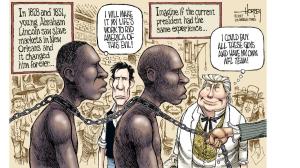 This is from the AP. “Trump ends ex-Vice President Harris’ Secret Service protection early after Biden had extended it.”
This is from the AP. “Trump ends ex-Vice President Harris’ Secret Service protection early after Biden had extended it.”
President Donald Trump has revoked former Vice President Kamala Harris’ Secret Service protection that otherwise would have ended next summer, senior Trump administration officials said Friday.
Former vice presidents typically get federal government protection for six months after leaving office, while ex-presidents do so for life. But then-President Joe Biden quietly signed a directive, at Harris’ request, that had extended protection for her beyond the traditional six months, according to another person familiar with the matter. The people insisted on anonymity to discuss a matter not made public.
Trump, a Republican, defeated Harris, a Democrat, in the presidential election last year.
His move to drop Harris’ Secret Service protection comes as the former vice president, who became the Democratic nominee last summer after a chaotic series of events that led to Biden dropping out of the contest, is about to embark on a book tour for her memoir, titled “107 Days.” The tour has 15 stops, including visits abroad to London and Toronto. The book, which refers to the historically short length of her presidential campaign, will be released Sept. 23, and the tour begins the following day.
CBS News reports this headline. “Joni Ernst won’t seek reelection to Senate in 2026, sources say.”
Republican Sen. Joni Ernst of Iowa has told confidantes she plans to reveal next week that she won’t seek reelection in 2026, multiple sources familiar with the matter told CBS News.Ernst’s announcement is scheduled for Thursday, the sources said. Ernst, 55, has served in the U.S. Senate since 2015.
Spokespeople for Ernst did not reply to requests for comment.
Some Iowa Democrats have already jumped into the race, including state Sen. Zach Wahls, state Rep. Josh Turek, and Des Moines School Board chairwoman Jackie Norris.
Ernst has been evasive about whether she would run for a third term in 2026, but in public remarks earlier this month, predicted continued GOP control of Iowa.
 This is from Zoe Schiffer writing at WIRED. “The White House Apparently Ordered Federal Workers to Roll Out Grok ‘ASAP’. A partnership between xAI and the US government fell apart earlier this summer. Then the White House apparently got involved, per documents obtained by WIRED.” You may remember this AI disaster went on full metal NAZI meltdown a few months ago.
This is from Zoe Schiffer writing at WIRED. “The White House Apparently Ordered Federal Workers to Roll Out Grok ‘ASAP’. A partnership between xAI and the US government fell apart earlier this summer. Then the White House apparently got involved, per documents obtained by WIRED.” You may remember this AI disaster went on full metal NAZI meltdown a few months ago.
The White House appears to have instructed leaders at the General Services Administration (GSA) to add xAI’s Grok chatbot to a list of approved vendors “ASAP,” according to an email sent by agency leadership earlier this week, which WIRED obtained.
“Team: Grok/xAI needs to go back on the schedule ASAP per the WH,” states the email, sent by Josh Gruenbaum, the commissioner of the Federal Acquisition Service. “Can someone get with Carahsoft on this immediately and please confirm?” Carahsoft is a major government contractor that resells technology from third-party firms.
“Should be all of their products we had previously (3 & 4),” the email continued, seemingly referring to Grok 3 and Grok 4. The subject line of the email was “xAI add Grok-4.”
Sources say Carahsoft’s contract was modified to include xAI earlier this week. Grok 3 and Grok 4 both currently appear on GSA Advantage (an online marketplace for government agencies to buy products and services) as of Friday morning. Now, following some internal reviews, any government agency can roll Grok out to federal workers.
The White House and GSA did not respond to a request for comment from WIRED.
The email comes after a planned partnership with xAI fell apart earlier this summer following Grok’s widespread praise for Hitler and the spouting of other antisemitic beliefs on X, WIRED previously reported.
 One last one as Yam Tits moves to take over more big American Cities beyond L.A. and the District. This is from Reuters and written by Tom Hals. ”
One last one as Yam Tits moves to take over more big American Cities beyond L.A. and the District. This is from Reuters and written by Tom Hals. ”
As President Donald Trump began his push to send the National Guard and Marines to U.S. cities, military leaders privately questioned whether the troops had received proper training and warned of the “far-reaching social, political and operational” risks of aiding law enforcement, according to a Reuters review of military records disclosed in court.
U.S. Army officials planning an operation in MacArthur Park during the June deployment in Los Angeles determined that using troops to protect agents carrying out Trump’s immigration crackdown posed an “extremely high” risk to civilians, troops and the military’s reputation, according to an internal document.
Officials warned that the operation could attract protests and spiral into a riot with potential for “miscommunication and fratricide” as well as accidental harm to civilians, including children, the operation planning document said.
The trove of internal military reports and messages, disclosed during a trial to resolve a lawsuit by California Governor Gavin Newsom, offers a rare inside look at concerns from commanders after Trump broke a long-standing tradition against using the military in support of domestic law enforcement over the objections of local officials.
Since deploying 4,000 National Guard and 700 U.S. Marines to Los Angeles to quell protests against immigration arrests, Republican Trump has sent National Guard troops to Washington and is considering expanding the military presence in other Democratic-run cities.
To mitigate the risks of the Los Angeles deployment, military lawyers drafted rules for using force and de-escalation that troops could access on their phones and that warned of the high stakes of the deployment.
The very nature of domestic operations — American military forces operating in U.S. communities — has such significant implications that the mistakes of a few soldiers can have far-reaching social, political, and operational effects,” according to an undated document titled “Los Angeles Civil Unrest SRUF.” The acronym means Standing Rules for the Use of Force.
Louis Caldera, Army Secretary to Democratic former President Bill Clinton, said in an interview that deploying the military domestically threatens to put soldiers and civilians at risk, undermines recruitment and erodes public support.
Trump has broken a lot of norms,” said Caldera. “His predecessors would not use the military in this way.”
I hope you have a great Labor Day Weekend. I plan to stay away from the news and throw myself into movies, books, and games which reflect a reality different from the horrible one we find ourselves in now. Hang tough! The resistance is growing.
What’s on your reading and blogging list today?
Mostly Monday Reads: Are we really even the United States Anymore?
Posted: August 25, 2025 Filed under: "presidential immunity", #MAGAnomics, #We are so Fucked, Agency Purges, American Fascists, cartoons, Civil Liberties, Civil Rights, Climate change, Crime, kakistocracy, Trump Krewe Crime and Punishment, tRump threat to society | Tags: 20th Anniversary of Hurricane Katrina, Deportation and Concentration Camp Madness, FEMA, John Buss @repeat1968, Kilmer Albrego Garcia, Piedmont Grannies, Trump defies Court Orders, Trump Edicts, Trump Maoist 4 Comments
“Time seems to be running out.” John Buss, @repeat1968
Good Day, Sky Dancers!
I have to admit that watching TV News is about as bad as I remember it when I was a kid, and watching body counts in Vietnam and little children my age being fire-hosed somewhere down south with a name that I’ve forgotten now. Between that and listening to my family history, I suppose it was inevitable that I would grow up with a strong sense of justice.
Watergate was a difficult time, but I always felt that the Supreme Court and Congress would properly deal with it. I was thrilled by the local desegregation efforts forced by the courts. It didn’t impact my school district, but it impacted me the few years I taught high school for the city public schools prior to finishing my master’s with an eye towards my doctorate. I headed to Oklahoma to fight for the passage of the ERA when I was pregnant with my oldest. I’ve never stopped fighting. Positive change was slow as a turtle, but it came, even though many things, but the ERA still rattles around out there waiting for the light of day. I have and will never quit the fight for true social justice.
I don’t know about you, but I dread what will show up in the news the next morning. Cruelty and ignorance are the flavors of the day. It was only a matter of time before we saw a headline like this one from Newsweek. “Donald Trump Issues Order Defying Supreme Court Precedent.”
A new executive order signed by President Donald Trump Monday bans the burning of the American Flag, in direct opposition to a precedent set by the Supreme Court in the Texas v. Johnson case in 1989 deeming the action an act of “symbolic speech”
Trump recognized while signing the order that the action was protected by the court but said that burning the flag was an open door to violence.
“They burn the American flag,” he said, adding “They call it freedom of speech.”
“When you burn a flag is the area goes crazy. If you have hundreds of people, they go crazy. You can do other things. You can burn this piece of paper, you can and it’s but when you burn the American flag, it incites riots at levels that we’ve never seen before,” the Trump said.
The executive order would create a penalty of one year in jail, Trump said during the press conference in the Oval Office.
 Evidently, burning the Constitution is acceptable. I can’t wait to see what the creepy, Christofascists that are the Republican Supreme Court Jurists have to say about that. I’m sure the Alitos and Thomases already have something disgusting in mind. Also, there is the sad news that Trump’s racism, xenophobia, ignorance, and cruelty have created an obsession with torturing Kilmar Ábrego Garcia and his family, once again. This is from The Guardian. It’s reported by Dharna Noor. “Kilmar Ábrego García detained after reporting to US immigration agents. Maryland man, back in the US after being wrongly deported to El Salvador, is threatened with deportation to Uganda.”
Evidently, burning the Constitution is acceptable. I can’t wait to see what the creepy, Christofascists that are the Republican Supreme Court Jurists have to say about that. I’m sure the Alitos and Thomases already have something disgusting in mind. Also, there is the sad news that Trump’s racism, xenophobia, ignorance, and cruelty have created an obsession with torturing Kilmar Ábrego Garcia and his family, once again. This is from The Guardian. It’s reported by Dharna Noor. “Kilmar Ábrego García detained after reporting to US immigration agents. Maryland man, back in the US after being wrongly deported to El Salvador, is threatened with deportation to Uganda.”
Kilmar Ábrego García – who has been thrust into the middle of an acrimonious deportation saga by the second Trump administration – has been detained after reporting to Immigration and Customs Enforcement (ICE) agents in Baltimore on Monday, just three days after his release from criminal custody in Tennessee.
“The only reason he was taken into detention was to punish him,” Simon Sandoval-Moshenberg, an attorney representing Ábrego, told a crowd of supporters outside a Baltimore ICE field office on Monday. “To punish him for exercising his constitutional rights.”
The attorney also said his client filed a new lawsuit on Monday morning challenging his potential deportation to Uganda and his current confinement.
Ábrego faces deportation to Uganda after recently declining an offer to be deported to Costa Rica in exchange for remaining in jail and pleading guilty to human smuggling charges, according to a Saturday court filing.
“The fact that they are holding Costa Rica as a carrot and using Uganda as a stick to try to coerce him to plead guilty for a crime is such clear evidence that they are weaponizing the immigration system in a matter that is completely unconstitutional,” Sandoval-Moshenberg said.
The lawsuit Ábrego filed early on Monday asks for an order “that he is not allowed to be removed from the United States unless and until he has had full due process”, said Sandoval-Moshenberg.
“The main issue, aside from the actual conditions in that country is – is that country actually going to let him stay there?” the attorney said. “They can offer to send him to Madrid, Spain, and unless Madrid, Spain, is going to let him remain in that country, essentially what it is – is a very inconvenient layover on the way to El Salvador, which is the one country that it has already determined that he cannot be sent to.”
The Costa Rican government has agreed to offer Ábrego refugee status if he is sent there, court filings from Saturday show. A judge in 2019 ruled that Ábrego cannot be deported to El Salvador.
Before walking into his appointment at the Baltimore Ice field office, Ábrego addressed a crowd of faith leaders, activists, and his family and legal team organized by the immigrant rights non-profit Casa de Maryland.
“My name is Kilmar Ábrego García, and I want you to remember this – remember that I am free and I was able to be reunited with my family,” he said through a translator, NBC News reported. “This was a miracle … I want to thank each and every one of you who marched, lift your voices, never stop praying and continue to fight in my name.”
After Ábrego entered the building, faith leaders and activists rallied to demand Ábrego’s freedom, chanting “Sí, se puede” (roughly “yes, we can”) and “we are Kilmar” as well as singing the hymn We Shall Not Be Moved with an activist choir.
“Laws have to be rooted in love, because love does not harm us,” a senior priest at Maryland’s St Matthew Episcopal church identified as Padre Vidal said through a translator.
According to the Wall Street Journal, “Kilmar Abrego Garcia Is Set for Deportation After ICE Arrests Him.”
 Indeed, nearly all of the reforms surrounding Due Process and access to the legal system seem destined to be attacked by Orange Caligula. This is from Reuters. It is definitely created to hinder the poor and people of color. “Trump signs orders aimed at ending cashless bail policies.”
Indeed, nearly all of the reforms surrounding Due Process and access to the legal system seem destined to be attacked by Orange Caligula. This is from Reuters. It is definitely created to hinder the poor and people of color. “Trump signs orders aimed at ending cashless bail policies.”
U.S. President Donald Trump signed an executive order on Monday that seeks to end cashless bail by threatening to revoke federal funding for jurisdictions that use it, part of a White House effort to push crime fighting to the top of the national agenda.
Trump signed a separate order that instructs police in Washington, D.C. to charge suspects with federal crimes and hold them in federal custody to avoid cashless bail, according to a fact sheet seen by Reuters.
“Cashless bail, we’re ending it. But we’re starting by ending it in D.C. and that we have the right to do through federalization,” Trump said during a signing ceremony in the White House.
Trump has seized control of the police force in Washington and is allowing National Guard troops to carry weapons while on patrol in the city. He is also threatening to expand the U.S. military presence to Democratically-controlled cities like Baltimore and Chicago.
Critics have slammed the administration’s actions as unnecessary overreach.
The focus on crime is seen as a preview of how Trump and his fellow Republicans plan to use the issue as they seek to retain control of both houses of Congress in the midterm elections next year.

Yes, I’m not fond of Joe Scarborough, but I am glad that he focused on the topic of violent crime and the really dangerous places. New Orleans has not seen this low level of shooting and violent crime in some time. This is true of most cities, including the ones where National Guard, like ours, are being sent to Blue Cities to hype a false narrative and scare people into not leaving their houses to do things like vote. The only exception in New Orleans is domestic violence. The rest are lower than the small rural towns of Louisiana, where gun violence is rampant. New Orleans shootings are comparable to what happened in the 1960s. The same cannot be said of Mike Johnson’s part of Louisiana. “Joe Scarborough Hammers ‘Red States’ as ‘Most Violent’: ‘Send’ National Guard to ‘Mike Johnson’s District’.” This is from Mediaite.
Morning Joe host Joe Scarborough hammered “red states” as the “most violent” in his takedown of President Donald Trump’s suggestion on Friday he may send National Guard troops to Chicago and New York City, as he has in Washington, D.C., as part of a crackdown on crime.
The tirade came on Monday morning’s show just days after Chicago Mayor Brandon Johnson openly pushed back on the president’s deployment threat, adding he was exploring legal options to block any such move.
As the Morning Joe crew reflected on Trump’s idea, Scarborough unloaded on the decision, defending New York City in particular as “one of the safest large cities” while comparing murder statistics there and in Chicago to “much higher” per capita figures for cities located in “red states.”
You know, the thing about this is, of course, we’ve talked about Washington, D.C., it’s the nation’s capital, a federal government, Congress could get involved, work with the president, and, together, as we’ve been talking about for a long time, figure out how to partner with the city. And that hasn’t happened. And now we’re talking about Chicago. We’re talking about New York City. Neither one of those cities are in the top ten for most violent cities in America.
Rounding on the numbers, the host then took aim at House Speaker Mike Johnson’s own district:
And if you want to look per capita, they need to do no more than look to Mike Johnson’s home state, the Speaker of the House, and look at violence per capita. You have a much higher chance of dying in Monroe, Louisiana, than you do Chicago, Illinois. A much higher chance of dying in Shreveport, Louisiana, than you do in Monroe. A much higher chance of dying in New Orleans, Louisiana, than you do in New York City.
I mean, New York, that’s fabulously crazy. New York City continues to rank as one of the safest large cities in America. And I don’t know that there’s a close second.
So, there are all of these cities and towns in red state America. You could look at Little Rock, Arkansas, you could look at Monroe, Louisiana, you could look at Shreveport, Louisiana. You could look at New Orleans, Louisiana. You could look at Memphis, Tennessee. You could look at one Nashville, Tennessee. You can look at one red state after another – Bessemer, Alabama – and you will see violent crime rates much, much, much higher per capita than Chicago, Illinois, San Francisco.
Throwing up a tweet of California Governor Gavin Newsom’s criticism of the move, Scarborough read it aloud and continued:
The chance of having violent acts committed upon you in Mike Johnson’s Louisiana, in red state Louisiana, red state that Donald Trump carried and every Republican has carried since Bill Clinton, the chances of being murdered in Louisiana 400 times higher than in California.
Let me say that again. Let me underline that again: You have a 400% higher chance of being murdered in red state Louisiana, Mike Johnson’s home state, than you do on the left coast in Gavin Newsom’s California.
There is no emergency. There is no logic to Chicago, to San Francisco, if you’re looking at the numbers, if you’re looking at data, I don’t even think this Supreme Court can turn a blind eye to this. They just can’t because data is data. Numbers are numbers, and the numbers are clear. And the numbers don’t justify – no emergency!
The host began calling on Trump to send the troops “to red states where they need them” and listed out all the cities he’d flagged statistics for:
Send those troops to Shreveport, Louisiana. Send them to Mike Johnson’s district. Send them to Little Rock, Arkansas. Send them to Memphis and Nashville, Tennessee. Send them to red states where they need them.
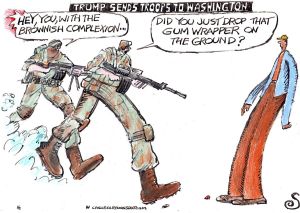 We have a huge Environmental Accident in Tangipoha Parish requiring evacuation and shutting down rivers, high violent crime in rural districts, and a looming Hurricane Season. Our National Guard will be worn out with all that marching around to deal with the state’s crises that are real.
We have a huge Environmental Accident in Tangipoha Parish requiring evacuation and shutting down rivers, high violent crime in rural districts, and a looming Hurricane Season. Our National Guard will be worn out with all that marching around to deal with the state’s crises that are real.
We’ve finally got the EPA in charge. I was actually thinking they were probably weakened to the point of uselessness. It’s also in a very red parish that needs help. But I suppose our Guard is getting to know these cities so they can block their inner city voting locations later. We have a governor with a need to appease Yam Tits and a bunch of Swampbillies that love him. He’s already expanding his control over the District and labelling it a place with a “crime emergency.”
The White House continues its plot to erase American History. Of course, his entire administration is filled with ignoramuses. “JD Vance flunks the basics on World War II as the White House targets history museums. If anyone would benefit from some quality time at a history museum, it’s White House officials. Take Vance’s line on the end of World War II, for example.” This is from MSNBC.
Donald Trump’s offensive against the Smithsonian reached a dramatic new level last week, with a presidential declaration that the institution and its museums are “OUT OF CONTROL.” To help bolster his point, the president added that Smithsonian history museums focus on “how bad Slavery was.”
The White House confirmed soon after that, as part of Trump’s broader efforts, administration officials want to target other museums, too. “He will start with the Smithsonian and then go from there,” a spokesperson told NBC News.
While the presidential campaign to control what Americans know and learn about history is clearly reflective of his authoritarian agenda, there’s also a degree of irony to the developments — because if anyone would benefit from some quality time at a history museum, it’s Trump and his team.
The president, for example, has talked about American forces having “manned the air” and taking over “the airports” during the Revolutionary War — despite the fact that airplanes didn’t exist at the time. He later said, “If you look at the end of the Civil War, the 1800s, it was a very turbulent time. You take the end day, was it 1869? Or whatever.”
His vice president isn’t much better. HuffPost noted:
Vice President JD Vance fumbled some very textbook facts of world history while talking foreign policy on Sunday’s ‘Meet the Press.’ During the interview, the Yale Law School alum defended President Donald Trump’s decision to entertain Russia’s terms for a peace deal with Ukraine by claiming all wars end in compromise.
NBC News’ Kristen Welker asked the Ohio Republican an important question, “If Russia is allowed to keep any of the territory that it illegally seized, what message does that send to China? Does it give China a green light to invade Taiwan? Does it give Russia a green light to invade other European countries, which is what your European allies are concerned about?”
Instead of answering the question directly, Vance took issue with the premise.
“Kristen, this is how wars ultimately get settled,” he said. “If you go back to World War II, if you go back to World War I, if you go back to every major conflict in human history, they all end with some kind of negotiation.”
No. If one actually goes back and assesses every major conflict in human history, they mostly ended with one force either conquering or repelling a rival force.
Meanwhile, a follow-up on the argument that Trump’s a Marxist and Maoist. Proper Industrial Policy is helping the industry thrive, not shaking it down for money and gifts!
 We’re coming on the 20th anniversary of Hurricane Katrina (Katrinaversary). This is my statement on it.
We’re coming on the 20th anniversary of Hurricane Katrina (Katrinaversary). This is my statement on it.
Whenever I think of all this, it still brings me to tears. I was lucky to drive out of there with my 2 labs and my munchkin cat. I sat on my friend’s sofa in Omaha, stunned, speechless, helplessly watching the suffering and death, with perpetual tears. What recovery we were granted was imperfect and incomplete. We will never forget. I was glad to come back home, but the sadness of knowing so many were lost just never leaves me.
With all the people we lost, who suffered, whose homes and businesses were gone, I offer up this news from the good people of FEMA. This is from the Washington Post. As if George W Bush didn’t kill a lot of us with Heckuva Job Brownie, and all those deadly Middle East quagmire wars, Trump’s management is upping the likely death count. “FEMA staff warn that Trump officials’ actions risk a Katrina-level disaster. About 180 FEMA employees, many of them anonymous, signed a letter to Congress arguing that the agency leadership has hindered the ability to effectively manage emergencies.” This is reported by Briana Sacks.
More than 180 Federal Emergency Management Agency employees sent a letter Monday to members of Congress and other officials, arguing that the agency’s direction and current leaders’ inexperience harms the agency’s mission and could result in a disaster on the level of Hurricane Katrina.
The letter, on which more than three dozen employees signed their full names, says that since January, staffers have been operating under leaders — Department of Homeland Security Secretary Kristi L. Noem, acting FEMA administrator David Richardson and former leader Cameron Hamilton — who lack the legal qualifications and authority to manage FEMA’s operations. This has eroded and hindered the agency’s ability to effectively manage emergencies and other operations, including national security work, the letter says.
After Hurricane Katrina became one of the worst disasters in the nation’s history, in part because of failures of local, state, and federal governments, Congress passed the Post-Katrina Emergency Reform Act to give FEMA more power and responsibility. That hurricane made landfall in southeast Louisiana in August 2005, leading to at least 1,800 deaths and $100 billion in damage. The resulting legislation allowed FEMA to better prepare communities for and help them recover from disasters.
But the letter warns that the Trump administration is sending the agency and country back to a pre-Katrina era, by not having a Senate-confirmed and qualified emergency manger at the helm; by slashing mitigation, disaster recovery, training and community programs; and by thwarting officials’ ability to make decisions because of a restrictive new expense policy.
The letter demands that federal lawmakers defend FEMA from the Homeland Security Department interference, protect the agency’s employees from “politically motivated firings,” conduct more oversight, and ultimately take FEMA out of DHS and establish it as an independent Cabinet-level agency in the executive branch.
“Our shared commitment to our country, our oaths of office, and our mission of helping people before, during, and after disasters compel us to warn Congress and the American people of the cascading effects of decisions made by the current administration,” the employees wrote, adding that they are sounding the alarm “so that we can continue to lawfully uphold our individual oaths of office and serve our country as our mission dictates.”
 If you want to know what Retired General Russell Honore, our Katrina Hero, has to say about all this, please follow him on his Facebook. He’s outspoken and frequently gives interviews. Here are his thoughts on NPR. “A retired general recalls Hurricane Katrina’s chaos and lessons still unlearned.”
If you want to know what Retired General Russell Honore, our Katrina Hero, has to say about all this, please follow him on his Facebook. He’s outspoken and frequently gives interviews. Here are his thoughts on NPR. “A retired general recalls Hurricane Katrina’s chaos and lessons still unlearned.”
“It broke my heart when I saw a lady with a toddler and a shopping basket pushing the baby in the water,” Honoré said in an interview with NPR’s Michel Martin. “The water was up to the baby’s chest and she was trying to get into the Superdome to save [the] baby and herself. And I said, ‘We’ve got to get these people out of here.'”
The Superdome was a last refuge for many. And as supplies ran low, it became a symbol of misery.
Before Katrina hit, forecasters warned of catastrophe if people failed to evacuate. But New Orleans Mayor Ray Nagin did not issue a mandatory order until Aug. 28, 2005.
Roughly 20% of the local population stayed behind, most of them being poor and elderly. “They want to stay because they know where the medicine is and many of them lived alone,”Honoré said. In some cases, the system failed them. “The city did send people to pick them up, but at that time, you couldn’t take an animal in an ambulance. And the elderly people said, ‘I’m not leaving if I can’t take my dog with me.'”
Since Hurricane Katrina, federal law has changed to include shelter for pets.
 I would also like to remind you that, as we speak, the folks who helped us most to recover are the fearless and hard-working men who came here to work. They still work here, and we depend on them. My friend Anne Renee shared this with me. It’s from NOLA.COM. “They came to rebuild New Orleans after Katrina. Under Trump, ICE is trying to deport them. Advocates have identified numerous Katrina workers detained by ICE under the Trump administration’s immigration crackdown.”
I would also like to remind you that, as we speak, the folks who helped us most to recover are the fearless and hard-working men who came here to work. They still work here, and we depend on them. My friend Anne Renee shared this with me. It’s from NOLA.COM. “They came to rebuild New Orleans after Katrina. Under Trump, ICE is trying to deport them. Advocates have identified numerous Katrina workers detained by ICE under the Trump administration’s immigration crackdown.”
“The cousins fled Guatemala’s rural highlands, seeking stability in the United States. They found it in a city ravaged by Hurricane Katrina.
Arriving in New Orleans after the storm, Abner Uriel Gomez Velasquez and Ever Eliseo Velasquez Fuentes found jobs in the booming industry Spanish speakers came to call “reconstrucción” — the back-breaking work of ripping mold-infested flooring, sodden drywall and fried appliances from flooded homes, and then, eventually, rebuilding them.
“Many left,” said Giovanni Lopez, a U.S. citizen and 40-year New Orleanian, born in Guatemala, who attends church with one of the men at St. Anthony of Padua in Mid-City, a hub for local Hispanic families. “They were here. They entered those homes first.”
New Orleans remains their home nearly two decades later.
Now, both men are confined to an Immigration and Customs Enforcement facility in north Louisiana, caught in President Donald Trump’s immigration dragnet.
Federal agents arrested the men, who have no criminal records, while they worked a construction job together near Lafayette on June 12 with two other St. Anthony parishioners, church leaders said. They are awaiting deportation at the Pine Prairie ICE Processing Center, accused of entering the country illegally on their way to New Orleans after Katrina.
As the city girds for the landmark storm’s 20th anniversary this month, the arrests have highlighted immigrants’ foundational roles in rebuilding.
Demand for workers so outstripped supply after the storm that the Bush administration suspended rules requiring employers to verify workers’ immigration status. A 2006 survey of construction workers in the city found half were Hispanic, and half of those were here illegally. And New Orleans’ Latino population grew by 71%, to 103,000 residents, between 2000 and 2013, according to Census data.
A precise number of Katrina construction laborers who remain in New Orleans is difficult to tally. But under Trump, whose administration has often detained immigrants accused of no other wrongdoing, lawyers and advocates have identified numerous Katrina workers apprehended by ICE. They include a man deported to El Salvador following a May worksite raid at a marquee New Orleans anti-flooding project.
The White House’s immigration strategy has driven up deportations. Yet it has not been applied evenly: outcry from community members and Republican lawmakers has led some detainees to be released, while others remain in jail or face deportation. Supporters of Gomez Velasquez and Velasquez Fuentes have petitioned for a measure of that relief, citing their contributions to New Orleans in letters to their congressmen.
Spokespeople for the Department of Homeland Security and ICE did not respond to multiple inquiries about Gomez Velasquez and Velasquez Fuentes’ cases.
The Trump administration has vigorously defended its agenda.
After the May New Orleans raid, an ICE spokesperson said the agency’s worksite enforcement aims to “deter employers who hire unauthorized workers,” and to “promote self-compliance in the business community.” The raids, they said, “protect employment opportunities for the nation’s workforce.”
A New Orleans story
The cousins each crossed the U.S. border with Mexico on their way north from homes in Guatemala’s verdant but impoverished San Marcos province. They entered “without inspection,” said Sue Weishar, a St. Anthony’s volunteer. Velasquez Fuentes came to New Orleans in 2006, and Gomez Velasquez followed in 2008.
They continued their construction careers — both became skilled caulkers — after the rebuild ended. They married. Gomez Velasquez met his wife Olivia in 2008 at a streetcar stop; Velasquez Fuentes met his wife Susana in 2016 in Metairie. They had children, all U.S. citizens.
And they deepened their faith. Gomez Velasquez leads a prayer group at St. Anthony, his home church. Velasquez Fuentes’ 16-year-old stepson was confirmed there.
Both men were unable to secure residency status because they did not qualify for many visa programs, such as those for relatives of adult citizens, people of certain professions and crime victims, church leaders said. They have not been accused of any other offenses.
“Our church recognizes that a country has the right to regulate its borders,” the Rev. Augustine J. DeArmond, St. Anthony’s pastor, wrote to the judge handling Gomez Velasquez’s case. “Our responsibility is also to act with justice and mercy.
On a recent Monday, about two dozen parishioners lined the church’s pews to pen letters calling for the men’s release. They asked the men’s families to describe how their detentions have upended their lives.
“I’ve never been separated from him for so long,” Axle, Gomez Velasquez’s 12-year-old son, said of his father as he fought back tears. “I miss him taking me to church and soccer. I want him to come home.”
I definitely have overdone it here. You may see so much American Spirit in so many. You may also assure yourself that we have the worst regime and the worst people ever in charge of it. Here are a few songs by us old, wrinkly hippies still protesting.
What’s on your reading and blogging list today?

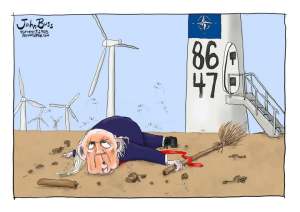
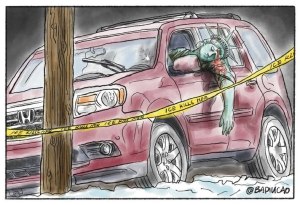
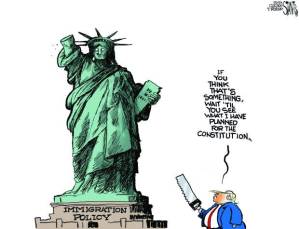 You may read the rest at the link. Dr. Paul Krugman also had a good headline for his latest
You may read the rest at the link. Dr. Paul Krugman also had a good headline for his latest  Michelle Goldberg used her column at the
Michelle Goldberg used her column at the 

 Today’s
Today’s  You may read the entire analysis at the link. It’s gifted, and it’s worth taking the time to read the entire thing. I was in high school when the entire Watergate scandal unfolded, and I must say that the entire experience profoundly shaped my political views.
You may read the entire analysis at the link. It’s gifted, and it’s worth taking the time to read the entire thing. I was in high school when the entire Watergate scandal unfolded, and I must say that the entire experience profoundly shaped my political views. One last bit of analysis by
One last bit of analysis by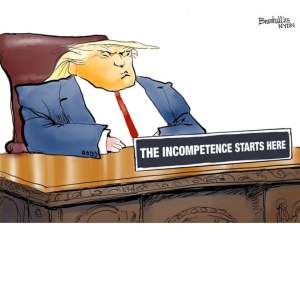 Read more at the link.
Read more at the link.



Recent Comments